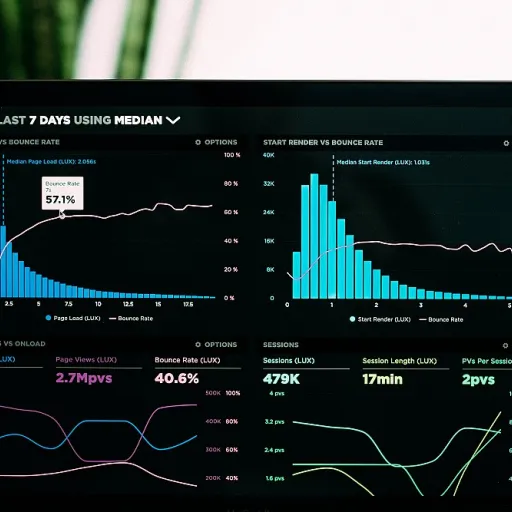
Understanding the role of AI in travel SEO services
AI’s Growing Influence on Travel SEO Strategies
Artificial intelligence is rapidly changing how travel businesses approach SEO. In the travel industry, competition for visibility on search engines like Google is fierce. AI-powered SEO services are helping travel companies adapt by automating complex tasks, analyzing massive data sets, and uncovering new opportunities for growth. These advancements are not just about keeping up—they’re about gaining a real edge in organic traffic and search rankings.
Automating and Enhancing SEO Processes
For travel agencies and businesses, AI brings efficiency and precision to SEO strategies. It can process large volumes of data from search console reports, user behavior, and competitor sites. This means travel SEO services can:
- Identify high-value keywords and trends faster
- Spot duplicate content issues that may harm rankings
- Optimize internal links and link building for better site structure
- Personalize content to match user intent and travel interests
With these capabilities, AI-driven SEO packages help travel businesses create quality content that appeals to both users and search engines. The result is a more effective SEO strategy that supports long term growth and improved visibility.
Why AI Matters for Travel Businesses
Travel websites face unique challenges: seasonal demand, rapidly changing destinations, and a need for up-to-date information. AI helps travel companies stay ahead by continuously monitoring search engine updates and adapting strategies in real time. This means your travel business can respond quickly to changes in Google search algorithms, ensuring your site remains competitive.
AI also supports smarter marketing decisions. By analyzing which keywords drive the most traffic and which links generate the best results, travel SEO services can refine their approach for maximum impact. This data-driven mindset is essential for any travel agency or business looking to build a sustainable online presence.
To learn more about building an effective digital channel strategy with AI-powered SEO, check out this guide on digital channel strategy with AI-powered SEO.
Challenges unique to travel industry SEO
Complexities of Search in the Travel Industry
The travel industry faces unique SEO challenges that set it apart from other sectors. With constant changes in consumer behavior, seasonal trends, and the need for up-to-date information, travel businesses must adapt their SEO strategy to remain visible on search engines like Google. The competition is intense, as countless travel companies and agencies compete for the same keywords and organic traffic. This makes it essential for any travel business to focus on quality content and effective link building to stand out.
Dynamic Content and Frequent Updates
Travel websites often deal with rapidly changing information, such as flight schedules, hotel availability, and destination restrictions. Keeping content fresh and accurate is crucial for both user experience and search engine rankings. Duplicate content is a common issue, especially when listing similar packages or destinations. Search engines may penalize sites with repetitive or outdated information, so travel SEO services must implement strategies to avoid these pitfalls and ensure each page provides unique value.
Seasonality and Search Trends
Seasonal fluctuations play a significant role in travel SEO. Search volume for certain destinations or travel packages can spike or drop dramatically throughout the year. This requires businesses to anticipate trends and adjust their keyword targeting and content calendar accordingly. An effective SEO strategy will help travel agencies find the right keywords and optimize their site to capture traffic during peak seasons, while also maintaining steady visibility during slower periods.
Link Building and Authority
Building a strong backlink profile is another challenge in the travel sector. High-quality links from reputable sources are essential for improving a website’s authority and ranking on Google search. However, the travel industry is notorious for aggressive link building tactics, which can sometimes lead to penalties if not managed carefully. Focusing on ethical, long-term link building strategies and leveraging internal links within the site can help travel businesses establish trust and authority in their niche.
Technical SEO and Site Structure
Travel websites are often large, with multiple categories, destinations, and service pages. Ensuring a clear site structure and proper use of internal links is vital for both users and search engines to navigate the website efficiently. Issues like slow page speed, poor mobile optimization, and broken links can negatively impact organic traffic and user experience. Regular audits using tools like Google Search Console can help identify and resolve technical issues before they affect rankings.
For more insights on how web design and digital marketing strategies can impact industries with complex needs, you might find this resource on effective marketing strategies for auto shops helpful.
AI-driven keyword research for travel websites
Unlocking High-Impact Keywords with AI
AI-driven keyword research is changing how travel businesses approach SEO. Traditional methods often miss out on emerging trends or long-tail keywords that can drive targeted traffic. With artificial intelligence, travel SEO services can analyze massive datasets from search engines, social media, and competitor sites. This helps identify not only high-volume keywords but also niche phrases that potential travelers are searching for right now.
- Trend detection: AI tools spot seasonal and trending keywords faster than manual research, giving travel companies a head start in content planning.
- Intent analysis: By understanding the context behind search queries, AI helps travel agencies align their content with what users are really looking for, improving user experience and increasing organic traffic.
- Competitor insights: AI-powered platforms can reveal which keywords competitors are ranking for, helping shape a more effective SEO strategy and uncovering new opportunities for link building and content creation.
From Data to Actionable SEO Strategies
AI doesn’t just find keywords—it helps prioritize them. By evaluating keyword difficulty, search volume, and relevance to your travel business, AI tools recommend which terms to target for the best return on investment. This is especially valuable for travel industry sites where competition is fierce and search intent varies widely.
For example, a travel agency might discover through AI analysis that "eco-friendly travel packages" or "family adventure tours" are rising in popularity. By integrating these keywords into quality content and optimizing internal links, the site can attract more qualified leads and improve its position in Google search results.
Supporting Long-Term Growth
AI-powered keyword research supports long-term SEO by continuously monitoring changes in search behavior and updating recommendations. This helps travel businesses avoid duplicate content issues and ensures their site remains relevant as trends evolve. For those looking to expand or franchise, exploring industries primed for franchising opportunities can also reveal new keyword niches and marketing strategies.
Ultimately, leveraging AI in keyword research allows travel SEO services to deliver more targeted, effective, and scalable results—helping travel companies stand out in a crowded digital landscape.
Personalization and user experience improvements with AI
Enhancing User Journeys with AI-Powered Personalization
Travel businesses face intense competition in search engine rankings, making it essential to stand out with tailored experiences. Artificial intelligence is now at the heart of this transformation, helping travel websites deliver content and services that match user intent more closely than ever before. AI analyzes user behavior, search patterns, and previous interactions to predict what travelers are looking for. This enables travel SEO services to present relevant destinations, deals, or travel packages at the right moment. For example, if a user frequently searches for adventure trips, the website can prioritize adventure-related content and keywords, increasing the likelihood of engagement and conversions.Dynamic Content Recommendations
AI-driven systems help travel companies automatically suggest articles, guides, or offers based on real-time user data. This not only improves the user experience but also supports SEO by increasing time on site and reducing bounce rates. Personalized recommendations encourage visitors to explore more pages, strengthening internal links and signaling quality content to search engines like Google.Optimizing for Search Intent
Understanding and matching search intent is crucial for travel SEO. AI tools can segment users by their stage in the travel planning process—whether they are researching destinations, comparing prices, or ready to book. By aligning content and keywords with these stages, travel businesses can better meet user needs and improve their rankings in Google search results.- Personalized landing pages for different traveler profiles
- Dynamic insertion of relevant keywords and offers
- Automated A/B testing to refine content and calls to action
Building Trust and Loyalty
Personalization powered by AI not only boosts organic traffic but also helps build long-term relationships. When users feel understood and valued, they are more likely to return, recommend the site, and engage with travel agency services. This approach supports a robust SEO strategy, as repeat visitors and positive interactions are key signals for search engines. In summary, leveraging AI for personalization is a powerful way for travel businesses to enhance user experience, drive more targeted traffic, and achieve sustainable growth in search engine visibility.Content creation and optimization using AI
How AI Streamlines Content Creation for Travel Websites
AI is changing the way travel businesses approach content creation and optimization. By leveraging advanced algorithms, travel SEO services can help your website produce quality content that attracts both users and search engines. AI tools analyze massive amounts of data, including search trends, competitor strategies, and user intent, to suggest topics and keywords that are most likely to drive organic traffic.
- Keyword Integration: AI-powered platforms identify high-value keywords for your travel business, ensuring your content aligns with what potential travelers are searching for. This helps your site rank higher in Google search results and increases visibility.
- Content Personalization: AI can tailor content to different segments of your audience, making your travel website more relevant and engaging. Personalized recommendations and dynamic landing pages improve user experience and encourage longer site visits.
- Duplicate Content Detection: Search engines penalize duplicate content. AI tools scan your site and flag any repeated or similar content, helping you maintain originality and authority in the travel industry.
- Internal Link Building: AI assists in building internal links by suggesting relevant connections between your pages. This not only helps users navigate your site but also distributes SEO value across your travel website, supporting a long-term SEO strategy.
Optimizing for Search Engines and Travelers
AI-driven content optimization goes beyond just adding keywords. It analyzes how users interact with your site, identifies gaps in your content, and suggests improvements that align with both search engine algorithms and user expectations. For travel agencies and companies, this means your SEO strategy is always evolving to meet the demands of the market.
- Content Quality: AI evaluates readability, structure, and relevance, ensuring your travel content meets the standards set by Google and other search engines.
- Link Building Support: AI can recommend authoritative sources for outbound links and identify opportunities for earning backlinks, which are crucial for boosting your site’s authority.
- Continuous Improvement: With AI, your travel SEO services can monitor performance through tools like Search Console, making real-time adjustments to keep your content competitive and effective.
By integrating AI into your content creation and optimization process, your travel business can stay ahead in the competitive online landscape. This approach not only helps you find the right keywords and topics but also ensures your website delivers value to both users and search engines, supporting sustainable growth in organic traffic.
Measuring success: AI-powered analytics in travel SEO
Tracking Real Results with AI Analytics
For travel businesses investing in SEO services, understanding what works is essential. AI-powered analytics tools are changing how travel companies measure the impact of their SEO strategy. These platforms go beyond basic metrics, offering deep insights into organic traffic, keyword performance, and user engagement across your travel website.
- Keyword Insights: AI tools help you find which keywords drive the most valuable traffic to your site. They analyze search intent, seasonality, and competition, making it easier to refine your SEO travel strategy for long-term growth.
- Content Performance: By tracking how quality content performs, AI can highlight which blog posts or landing pages attract visitors and keep them engaged. This helps you focus on topics that resonate with your audience and avoid duplicate content issues.
- Link Building Analysis: AI can monitor your internal links and external link building efforts. It identifies which links boost your site’s authority and which may need improvement, supporting a healthy link profile for better Google search rankings.
- User Experience Signals: AI analytics platforms measure user behavior, such as time on site and bounce rates. These insights guide travel agencies in enhancing personalization and user experience, which are crucial for SEO success.
- Competitor Benchmarking: AI-driven tools compare your travel business’s SEO performance with competitors. This helps you spot gaps in your marketing strategy and adjust your SEO packages for maximum impact.
Using Search Console and AI for Continuous Improvement
Integrating Google Search Console data with AI analytics gives travel industry professionals a comprehensive view of their website’s health. AI can automatically detect technical issues, track changes in search engine rankings, and recommend actionable steps to improve visibility. This continuous feedback loop ensures your SEO services remain effective and adapt to evolving search engine algorithms.
Ultimately, AI-powered analytics empower travel companies to make data-driven decisions, optimize their content, and build a robust SEO strategy that delivers measurable results. By leveraging these advanced tools, travel businesses can secure a competitive edge in the crowded online travel market.













